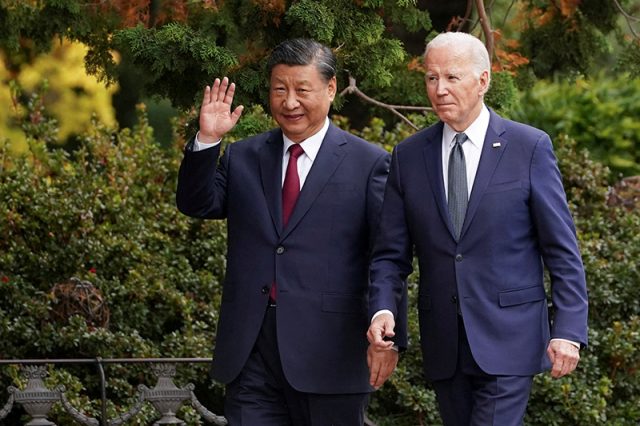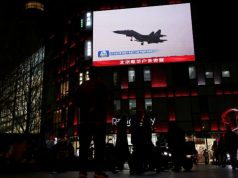
China’s leader Xi Jinping flew into San Francisco to meet US president Joe Biden on November 15 for his first visit to the US since 2017.
The meeting, at the Asia-Pacific Economic Cooperation (APEC) conference, was slightly longer than expected, at four hours. This has been taken as a sign that the relationship between the two super powers is warming up slightly after a significantly rocky period, marked by a trade war and a Chinese spy balloon entering US airspace.
After the meeting Xi said the doors between the two countries cannot “be closed again”.
There have been some small but important steps in potentially reducing the risk of a potential cold war. Avoiding another cold war has been one of Xi’s key objectives, outlined in what has been labelled as the “Five Nos” stated at the 2021 Alaska Summit between China’s director of the Office of the Central Commission for Foreign Affairs, Yang Jiechi, and US secretary of state, Antony Blinken. Biden said after the San Francisco summit that while the China-US relationship is competitive, his responsibility is to make it “rational and manageable”.
The summit has been vital for Xi’s bid to stabilize China’s domestic situation, and potentially to gain more access to US businesses. There were signs this was paying off, with a number of important US business leaders headed to San Francisco to meet with Xi. This comes at a time of significant turmoil in the Chinese economy, which include high levels of youth unemployment and an export slump.
Xi seeks a level playing field for Chinese firms in the US, while also aiming to show foreign investors that China is still open for business and investment. In advance of the summit, Beijing has sought to win over US business leaders, who are seen as less hawkish on China than their political counterparts as well as being the primary beneficiaries of US-China trade.
This was demonstrated by the visits of Microsoft’s Bill Gates and Apple’s Tim Cook to China earlier in 2023, where they received a bigger reception that many heads of state. China views the trade tensions between the US and itself as having adverse effects on US businesses too, which it hopes it can use to lobby Washington to moderate its stance towards Beijing. As a result, winning over business leaders such as Cook and Gates is just as important as convincing political leaders such as Biden.
This summit can also be seen as furthering Beijing’s efforts to improve its relationships with many western nations, underlined also by the visit of the Australian prime minister, Anthony Albanese, to Beijing on November 4 2023. This marks a departure from its earlier aggressive foreign policy stance dubbed “wolf warrior” diplomacy. The way the summit has unfolded may have been a sign that China doesn’t want further confrontation with the west right now.
Biden’s statement that Washington does not support full Taiwanese independence, while still being concerned about Chinese military intervention on the self-governing island gives Xi a bit more breathing space to focus elsewhere, perhaps de-escalating tension between the two over the long-term future for Taiwan.
A pause in the tension with the US is potentially useful for both Beijing and Washington as they grapple with their own domestic politics, and conflict around the world.
Possibly the most significant obstacle to Xi’s goals at the summit have been the economic tensions between the US and China, which peaked under Donald Trump’s leadership. These tensions have been highlighted by the discussion over “de-risking” ties with China by the US and its allies. This would involve the termination or restriction of business ties with Chinese entities. Beijing views this as a US effort to constrain its economic development.
Talk of “decoupling”, by cutting trade with China, has largely been dismissed by senior US officials, such as secretary of the treasury, Janet Yellen, and Senate majority leader, Chuck Schumer.
China’s strengths
There are several reasons for China to be confident in its negotiating powers with the US. One of these can be seen in the apparent failure of the US-led trade war to stymie China’s technological development, with restrictive measures such as chip curbs resulting in Chinese firms switching to Huawei processors.
Such moves have cost US firms such as Nvidia the Chinese market while seemingly making little impact on Chinese innovation. This, in turn, has lessened the amount of economic leverage that the US has over China.
The US has its own strategic challenges, with the conflicts in Ukraine and Gaza placing American capacities under greater strain. In China’s eyes, an overextended US is less willing to open a third front in Asia.
This further strengthens China’s position, with the additional benefit of these conflicts strengthening China’s influence in Russia and the developing world. As a result, China’s diplomatic standing and clout is perhaps stronger than expected.
So far, there have been a few token agreements such as resumption of high-level communication contact between the US and Chinese militaries, which marks a notable de-escalation in the tensions between the two.
While Apec is a step in the right direction for reducing Sino-US tensions, it is somewhat doubtful that Xi has won everything that Beijing wanted. Meanwhile, Biden will be scrutinized by the opposition for not giving too much away to China. This is pertinent because he faces an election next year, where his most likely opponent is Donald Trump, who was famous for his hardline stance on China. Consequently, any concession to Beijing may cost Biden dearly in his bid to be re-elected.
What can be delivered from the summit is a pause in China-US tension rather than an end to it. In the face of the challenges in restructuring China’s economy and the US’s geopolitical quagmires, perhaps breathing room is the best that Beijing and Washington can hope for.![]()
Tom Harper, Lecturer in International Relations, University of East London. This article is republished from The Conversation under a Creative Commons license. Read the original article.
RELATED: Explainer: What to expect when Biden meets Xi Jinping in San Francisco









